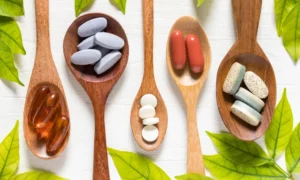Polycystic Ovary Syndrome (PCOS) is a common hormonal disorder that affects not only adults but also teenagers. Understanding and addressing PCOS in adolescence is crucial for long-term health and well-being. In this article, we’ll explore the nuances of PCOS in teenagers and PCOS teenager treatment options along with practical tips for managing symptoms.
Contents
Understanding PCOS In Teenagers 
PCOS, or Polycystic Ovary Syndrome, can also affect teenagers. PCOS is a hormonal disorder that affects individuals with ovaries, causing an imbalance in reproductive hormones. In teenagers, PCOS may manifest differently than in adults, but it shares common features.
Key characteristics of PCOS in teenagers may include:
- Irregular Menstrual Cycles: Teenagers with PCOS often experience irregular periods or may even skip them altogether. This is due to the hormonal imbalances affecting the normal menstrual cycle.
- Ovulatory Dysfunction: PCOS can lead to difficulties with ovulation, the process in which an egg is released from the ovary. This can impact fertility and menstrual regularity.
- Hyperandrogenism: Elevated levels of androgens, such as testosterone, may be present in teenagers with PCOS. This can lead to symptoms like acne, excess facial and body hair (hirsutism), and male-pattern baldness.
- Polycystic Ovaries: Despite the name, not all individuals with PCOS have cysts on their ovaries. In the context of PCOS, the term “cysts” refers to small, immature follicles that may accumulate in the ovaries.
- Insulin Resistance: Many individuals with PCOS, including teenagers, may experience insulin resistance. This can contribute to weight gain and may increase the risk of developing type 2 diabetes.
It’s essential for teenagers with suspected PCOS to consult with a healthcare professional for proper diagnosis and management. Lifestyle modifications, such as a healthy diet and regular exercise, may be recommended. In some cases, hormonal medications may be prescribed to regulate menstrual cycles and manage symptoms. Early detection and intervention can help mitigate long-term complications associated with PCOS.
Impact Of PCOS On Mental Health Of Teenagers
Polycystic Ovary Syndrome (PCOS) can have a significant impact on the mental health of teenagers. The hormonal and physical changes associated with PCOS, along with potential societal pressures and self-esteem issues, can contribute to various mental health challenges. Here are some aspects to consider:
- Body Image Concerns: Teenagers with PCOS may experience symptoms such as weight gain, acne, and excess hair growth, which can affect body image. These physical changes may lead to feelings of self-consciousness and contribute to a negative self-image.
- Emotional Distress: Coping with the symptoms and uncertainties of PCOS, including irregular menstrual cycles and potential fertility concerns, can cause emotional distress. Anxiety and worry about the future may be heightened in teenagers who are navigating the challenges of adolescence.
- Impact on Self-Esteem: PCOS-related physical changes, especially those affecting appearance, can impact self-esteem. Teenagers may feel different or isolated from their peers, leading to a negative perception of themselves.
- Social Challenges: Managing PCOS symptoms can interfere with social activities and relationships. Teenagers may feel hesitant to participate in certain activities or events due to concerns about their appearance or unpredictable menstrual cycles.
- Stress and Coping Mechanisms: Dealing with the chronic nature of PCOS and its potential long-term implications can be stressful. Teenagers may develop coping mechanisms, and in some cases, these might not be healthy, such as engaging in disordered eating or avoidance behaviours.
- Depression: The combination of hormonal changes, physical symptoms, and societal pressures may contribute to symptoms of depression in teenagers with PCOS. Persistent feelings of sadness, hopelessness, and low energy can affect daily functioning.
- Impact on Relationships: PCOS can impact relationships with family and friends. Communication about the condition and its effects may be challenging, and the emotional toll it takes on the teenager may influence their interactions with others.
Diagnosis And Medical Intervention 
Diagnosing and managing Polycystic Ovary Syndrome (PCOS) in teenagers involves a comprehensive approach, typically carried out by healthcare professionals. Here are the key aspects of the diagnosis and medical intervention for PCOS in teenagers:
Medical History and Physical Examination
- The healthcare provider will gather a detailed medical history, including information about menstrual cycles, symptoms, and family history of PCOS or related conditions.
- A physical examination may be conducted to assess signs of PCOS, such as hirsutism (excess hair growth), acne, and abdominal obesity.
Blood Tests
- Hormonal blood tests are often performed to measure levels of various hormones, including testosterone, luteinizing hormone (LH), follicle-stimulating hormone (FSH), and anti-Müllerian hormone (AMH).
- Blood tests may also include checking insulin levels, as insulin resistance is common in PCOS.
Ultrasound
- A pelvic ultrasound may be conducted to visualize the ovaries. In PCOS, the ovaries may show multiple small follicles, giving them a characteristic appearance described as “polycystic.”
Diagnostic Criteria
- Diagnosis is often based on criteria established by organizations such as the Rotterdam criteria, which include the presence of irregular menstrual cycles, clinical or biochemical signs of hyperandrogenism, and polycystic ovaries on ultrasound.
Lifestyle Management
- Lifestyle modifications are a key component of PCOS management in teenagers. This includes promoting a healthy diet, regular exercise, and weight management to address insulin resistance and improve overall well-being.
Medications
- Hormonal contraceptives (birth control pills) may be prescribed to regulate menstrual cycles and reduce symptoms like acne and hirsutism.
- Anti-androgen medications, such as spironolactone, may be used to address symptoms related to elevated androgen levels.
Insulin-Sensitizing Medications
- Metformin, an insulin-sensitizing medication, may be prescribed to manage insulin resistance, especially in cases where there is a risk of developing type 2 diabetes.
Fertility Treatment (if needed)
- For teenagers concerned about fertility or facing challenges due to anovulation, fertility medications may be considered under the guidance of a reproductive endocrinologist.
Psychological Support
- Mental health support is essential. Teenagers with PCOS may benefit from counseling or support groups to address the emotional impact of the condition.
It’s crucial for teenagers with PCOS to have ongoing follow-up appointments with their healthcare provider to monitor symptoms, adjust treatment plans as needed, and address any concerns or new developments. An individualized and holistic approach is key to managing PCOS in teenagers effectively.
Alternative Therapies And Natural Remedies 
While medical interventions are often recommended for the management of Polycystic Ovary Syndrome (PCOS) in teenagers, some individuals may explore alternative therapies and natural remedies to complement conventional treatments. Here are some alternative and natural strategies that some people with PCOS consider:
- Dietary Changes
- Balanced Diet: Adopting a balanced and nutritious diet may help manage symptoms associated with PCOS. Focus on whole foods, fruits, vegetables, lean proteins, and whole grains. Limit processed foods and added sugars.
- Low-Glycemic Diet: Some individuals find benefits in following a low-glycemic diet to help regulate blood sugar levels and improve insulin sensitivity.
- Regular Exercise
- Physical activity can help with weight management, improve insulin sensitivity, and regulate menstrual cycles. A combination of aerobic exercises and strength training may be beneficial.
- Herbal Supplements
- Some herbal supplements are believed to have potential benefits for PCOS symptoms. Examples include spearmint tea (thought to have anti-androgenic properties) and supplements like inositol, which may help improve insulin sensitivity.
- Mind-Body Practices
- Stress management techniques such as yoga, meditation, and deep breathing exercises can support overall well-being. Chronic stress may exacerbate symptoms of PCOS.
- Acupuncture
- Acupuncture is an alternative therapy that involves the insertion of thin needles into specific points on the body. Some studies suggest that acupuncture may help regulate menstrual cycles and reduce symptoms associated with PCOS.
- Adequate Sleep
- Prioritize getting enough quality sleep. Lack of sleep can contribute to hormonal imbalances and insulin resistance, potentially worsening PCOS symptoms.
- Omega-3 Fatty Acids
- Foods rich in omega-3 fatty acids, such as fatty fish (salmon, mackerel), flaxseeds, and walnuts, may have anti-inflammatory effects and could be beneficial for managing PCOS.
- Vitamin D Supplementation
- Adequate levels of vitamin D are essential for overall health. Some studies suggest that vitamin D supplementation may have a positive impact on insulin sensitivity in women with PCOS.
Conclusion
In conclusion, addressing PCOS in teenagers involves a holistic approach encompassing medical, lifestyle, and emotional components. By providing support, and education, and fostering resilience, we can empower teenagers to navigate the challenges of PCOS successfully.
If you are facing PCOS related issues, pcos treatment at HerMantra can help. Book your free trial online pcos treatment session now.





